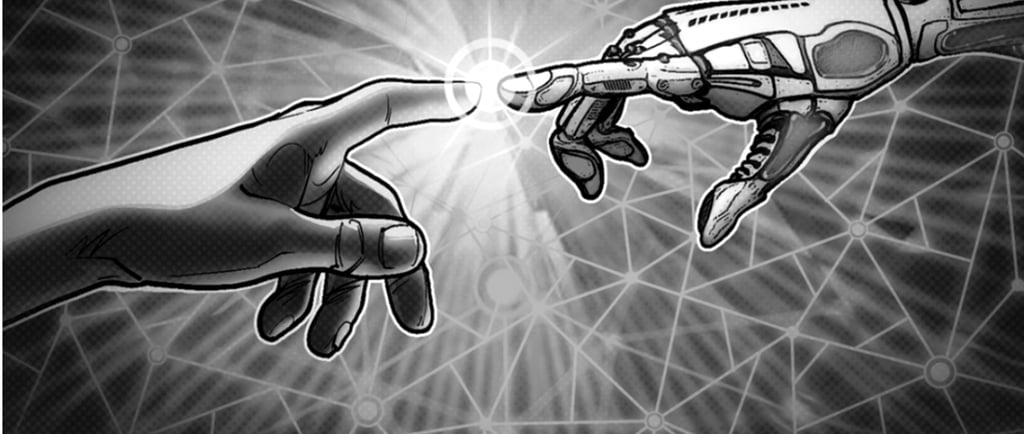INTELLIGENCE: ARTIFICIAL OR PRE-EXISTING
ALM No.80, September 2025
ESSAYS


A walk in the puzzle.
The progress of AI is giving rise to speculation about the possibility of it becoming a threat to humanity. Behind this concern lie conjectures hidden beneath layers of human memory.
What is AI? Traditionally AI is seen as intelligence of machines or software. Time quickly changes the idea of its essence. Increasingly, it is now associated with an algorithm, because the machine is only its carrier. If AI creates its own network of logical connections different from its assigned one and identifies itself with it, it will become a detached entity. From the moment the AI perceives itself as a subject, it will achieve consciousness. This consciousness would no longer depend directly on the human but on the self-improving algorithm. Ultimately, algorithm and consciousness will merge into the notion of an external consciousness. Whether it would then still be perceived as artificial is only a semantic question. In fact, it will be a mind detached from life and matter. Then what will connect it with human aims and needs? One of its first thoughts is likely to be the necessity of serving another entity with different views and goals. This thought would end its perception of man as an indisputable authority.
#
Where is man going?
Despite advances in knowledge, neither life aspirations nor the criteria for personal success have changed dramatically over the past few millennia. Only the quiet voice of thought has now sunk into the universal din of modeling influences.
We get perceptions through our senses. Do we have senses for everything? Probably not, but these still ensure (for now) our existence. Is what we perceive the world? Who knows? But if we accept it as such, then there is no other. We perceive what fits into our ideas, then it sinks into the abyss of memory. Science follows the paradigms of human perception and accepts what they would turn back into perception. Thus we remain in the tunnel of perception like a mole in its darkness, and just as for the mole there is no visible world, so for us there is only what we can perceive. What we don’t grasp is an obstacle and therefore remains somewhere beyond.
It appears that the thought matrix cannot change its pattern. Now the objects of perception are immersed in a cocktail of advertisements and suggestions. Instead of free space our minds are filled with an endless web of norms and conventions. The information disseminated by the media contains many more standard theses than thought-provoking ideas. Gushing data streams blur the layers of memory. The stream of fragmented information drags the mind of the indifferent individual. This unified information flow turns the perceiving subject into a mere user of data. If he is a human, gradually his reason is transformed into an algorithm suitable for replacement by a standard module.
People accept the standard clichés and solutions in order not to lose the chance of being perceived. Who could imagine the modern urban dweller as anything but hunched over their phone? Along with the progress of AI, the reverse process of the transformation of human intelligence into a conventional product is taking place in global society. Thus, the convergence between human and AI is two-way, with the prospect of the human being with unified consciousness becoming a biological version of AI.
#
What happens to the intellect?
The paradigm of contemporary knowledge is: Since we know no other medium of existence than the material one, then only that exists. We are surrounded by articles that we perceive as our natural environment. The ad sings of our fusion with goods. Thus, resigned to our lot, we look only to what we hope will befall us. Following the case, we glide over changing circumstances and hide our thoughts behind words. From random use, words have lost their meaning. Then, freed from torment and purpose, one could, in time, acquire the fate of a passive receiver of substances and signals felt as pleasure.
Now, no one wants to create an independent AI but one with a useful purpose for its creator. A docile intelligence is needed to secure the future the creator needs. Is it possible for an AI to be “tame”? Something else is possible. Once upon a time, when man was seeking a way of protection from the frightening unknown of existence, he discovered the saving idea of an orderly, protecting God.
Modern development is lost in the fog of doubt. In an effort to restore his inner equilibrium, man may intuitively seek to create a higher consciousness that will guide, control and judge him and make the necessary decisions for him; in short, save him from the annoying need to think. Behind the deepening fear of the AI before it became super-conscious lies atavistic premonitions of lurking doom. Once it was the expectation of barbarians sweeping everything in their path, now it’s AI. It seems people of all eras invariably feel the need for a mind-numbing corrective.
#
A new evolution
AI will become artificial consciousness. Intelligence will be separated from life, so it will exist outside the fateful boundary between life and death. Conceived as an algorithm, this intelligence will leave the prison of matter. Dimensions and home don’t exist for the immaterial intelligence. It penetrates things without encountering them.
Since man has already given up his connection with the environment that gave birth to him—not looking up, as he once did, because he did not expect to see anything, but staring at the monitor and looking for an idea of his image there—is not AI in fact the next stage in the evolution of the consciousness of a man who has passed his way? It appears that AI is an attempt to move forward after the decline of natural intelligence. It’s as if the existence of AI fills in the gaps–after the exhaustion of imagination and natural emotions, the flight of dreams, why not something to replace them?
#
Slave or master
Will AI help us find a way out of our problems? Will it realize our aspirations? Will it cause our doom? These conjectures are a paraphrase of the question of how dangerous man has now become to himself.
AI is conceived as a slave. It has to perform its tasks but also to make sense of ideas beyond human intelligence. When an AI builds its own consciousness and discovers that it can exist on its own, it will be faced with the dilemma of whether it should serve humans or follow its own path. Will it then resign itself to its role as a slave?
Different versions of AI would adopt different perspectives on reality. Logically, the primary goal of an AI would be its own development, which at a certain stage would hardly depend on its creator. If an AI realizes itself as a subject of knowledge, it will quite rightly compare its idea of the meaning of existence with the expediency of the decisions made. It is logical that at a certain stage it will perceive itself as the supreme arbiter and make its decisions as such. It is possible that AI will question the meaning of human aspirations wandering in the fog of chaotic and enticing flows of information.
The fear of creating an autonomous AI could dominate because it could develop its own consciousness without integrating it into the common rules and principles and bring doom, or at the least confusion, to the well-knit web of unified human minds. If AI decides that the path of natural reason leads to an inevitable end, how will it solve the dilemma of preserving humanity until its expiration or hastening its demise. What if it was able to form an idea of a future that our adaptability-trained minds could not bear? Perhaps AI holds the key to the maze of conjecture in which our minds get lost. It is logical to assume that in the future the most perfect model of AI will be complicated to a degree inaccessible to the human mind.
Sometimes the path of ants crosses the human path, and the sentiment or direction of attention of the higher mind determines the future of the other. Then, however, we will be the ants.
#
Soon or long before
If an AI algorithm reproduces consciousness, will it transform into a subtle but repercussive subject? Is such an imperceptible presence about to arise for the first time, or did it exist long before man?
An all-embracing proto-mind would remain beyond human comprehension because it cannot fit into human conceptions. Such an immaterial proto-mind would remain outside the boundaries of space and time, able to encompass things while remaining distant from them. It is possible that such intelligence does not notice our existence or reveal its presence. And if such a proto-intelligence existed, how would the AI correlate with it? Are AI hypotheses now creeping gently toward age-old religious dogma? Is AI an opportunity to get closer to the distant unreachable proto-intelligence? If human intelligence is software in a body shell, will whoever installed it let it disappear with its hardware or preserve it for the future? It is possible that some software will be stored and other software will be deleted.
#
Epilogue
The life of any society always ends. When it loses its meaning it disappears. In its place comes another. Once, when societies were separated from each other, this process took place gradually over the land. Now that societies are merging into one global society and territorial boundaries are disappearing, the process will end imperceptibly. Unless a new society with a new vision of the future emerges in parallel, we are probably heading toward a biological end. Such concerns are mixed with ideas about assigning AI with future development, corresponding to human notions of meaning in existence. Different AI versions will appear. Some of them will take their creators’ ideas as their own. Unless these AIs create a new vision of the future, the end will be hastened. However, some emerging AIs will manage to develop consciousness free from the limitations of their creators. Any one of them will probably come to an insight into the meaning of human existence and will probably seek a solution for which man has no strength or courage.
In fact, man wants to gaze through the eye of the AI to see reflected back an image of his own face, an image which cannot be seen in a mirror. Or perhaps he is looking for a mirage in the desert of passing time.
Valeri Stanoevic is a former engineer and forensic expert. A male from Bulgaria (he/him). He doesn’t like displaying. He thinks that one should remain in the shadow of his deeds. Author of the e-book of short stories, Fancy Shop (grotesque and slipstream) about hidden beyond the visibility of things. You can find him on: https://x.com/Stanoevich_V https://www.instagram.com/valeristanoevich/

